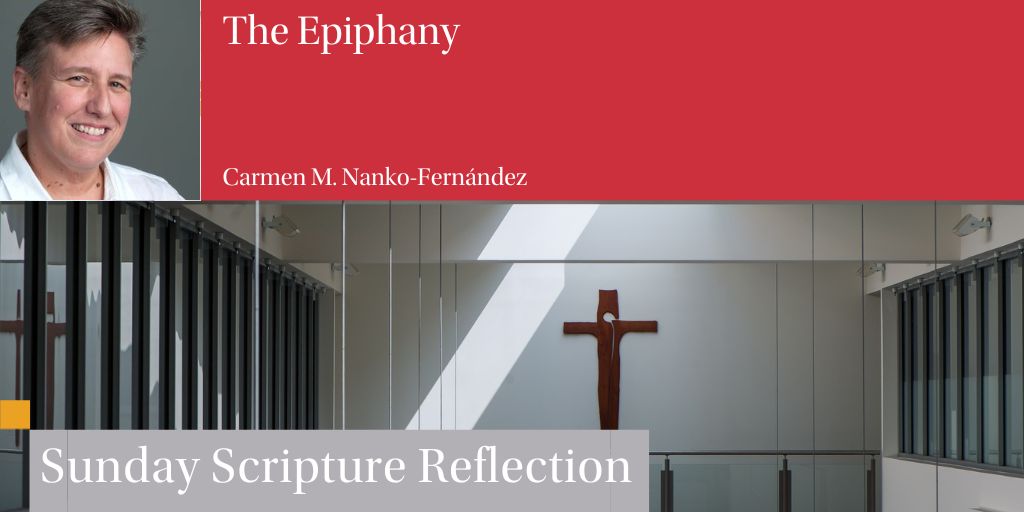
Readings:
Isaiah 60:1-6
Psalm 72:1-2, 7-8, 10-11, 12-13.
Ephesians 3:2-3a, 5-6
Matthew 2:1-12
The gospel of Matthew reveals little about the magi. Much of what we pass on, including their names and number, comes from some early apocryphal texts, fanciful medieval legends, and cultural adaptations that have attempted to fill in the gaps across the centuries. Some details appended to the magi, like the gifts of gold and frankincense, imagining them as kings, or even their transit by means of camels, a staple of many nativity scenes, find their roots in Old Testament texts such as the passages from Isaiah 60 and Psalm 72 that frame the lectionary readings for this feast of the Epiphany.
Other more distinctive details reflect the particularities of the cultures that make the magi their own. For example, Christiane Assefa a scholar at the intersections of Black Diaspora Studies and Critical Refugee Studies, explains that each small cup served in the Ethiopian coffee ritual of buna “is sequentially called Abol, Tona, and Baraka. These are the names of the three wise men who traveled from Ethiopia to visit the new born baby Jesus with gifts of gold, frankincense, and myrrh. The three cups honor them and their long trek during which they drank coffee to sustain themselves.”
Other details reflect the signs of the times that form and inform the artisans who craft the artistic images that adorn countless seasonal nacimientos and Christmas cards. One of my favorite renderings of the magi is a Covid-era wooden carving of los Tres Reyes Magos by the Puerto Rican artisan Héctor Orta. Mounted on horseback, a traditional Puerto Rican way of portraying them, the magi wear medical masks covering their noses and mouths. Through this simple detail, the carver indicates the pandemic that endangered the context of his times. Similarly, the evangelist reminds us of troubles with the ominous last words of today’s gospel, that the magi: “having been warned in a dream…departed for their country by another way” (Matthew 2:12).
The coffee that gave the Ethiopian kings the stamina to endure the journey, Orta’s masked magi, the gospel’s warning dream and three gifts: each of these points to the vulnerability of the human condition, a vulnerability that is assumed, with our humanity, in the Incarnation of the Word. The gifts of the magi are often thought of as symbolic, yet they are also practical, even the more seemingly exotic gifts! Frankincense and myrrh are valued to this day for their therapeutic properties. Like Orta’s medical masks, these gifts express a holistic concern for life, health, and well-being, especially of those made most vulnerable.
These varying details—coffee, facemasks, dreams, frankincense, myrrh, gold—each in their own way, recognize and address the fragility of human life with its physical limitations, health challenges, safety threats, and economic insecurities. Such vulnerability is shared by the magi themselves, their traveling party, all they would encounter along the way, as well as the subject of their search, a child. Such vulnerability is shared by those who partake in the buna ritual, the carvers, the storytellers, those in need of sustenance and protection and companionship to endure long journeys, in other words, all of us.
On this Epiphany Sunday, Pope Francis opens the last of five Holy Doors commemorating the 2025 Jubilee Year of Hope, four are at the major basilicas in Rome and one is at the Rebibbia New Complex Prison. In his homily at the prison, Francis called on all, even those most vulnerable among us, to keep the doors of our hearts open, even in the most difficult situations when “one thinks that everything is over, that nothing can be resolved. But hope never disappoints.” Francis left Rebibbia with a practical gift given to him by the prison’s residents and guards, a basket containing oil, cookies, and ceramics. In our shared humanity and vulnerability, whether we travel in pilgrimage, or cross borders in search of refuge, or never leave our neighborhoods, prison cells, or hospital beds, we are invited to journey in hope and to embrace the Incarnate Word present in our encounters with each other along the way.
Carmen M. Nanko-Fernández is professor of Hispanic theology and ministry and director of the Hispanic Theology and Ministry Program at the Catholic Theological Union in Chicago.
To learn more about…
Ethiopian Coffee Ritual see Christiane Assefa, “Buna: on the culture, creativity, and self determination of East African refugees,” The Critical Refugees Studies Collective, January 27, 2020, https://criticalrefugeestudies.com/blog/buna-on-the-culture-creativity-and-self-determination-of-east-african-refug.
Studies on the therapeutic properties of frankincense see https://pubmed.ncbi.nlm.nih.gov/27117114/.
Holy Year Jubilee 2025 see https://www.iubilaeum2025.va/en.html; and Pope Francis, Spes non confundit, Bull of Indiction of the Ordinary Jubilee of the Year 2025, May 9, 2024, https://www.vatican.va/content/francesco/en/bulls/documents/20240509_spes-non-confundit_bolla-giubileo2025.html.
This Sunday Scripture Reflection includes portions of themes I initially developed in “A reflection for the feast of the Epiphany,” homily text and video, US Catholic, January 8, 2023, https://uscatholic.org/articles/202301/a-reflection-for-the-feast-of-the-epiphany-3/.
